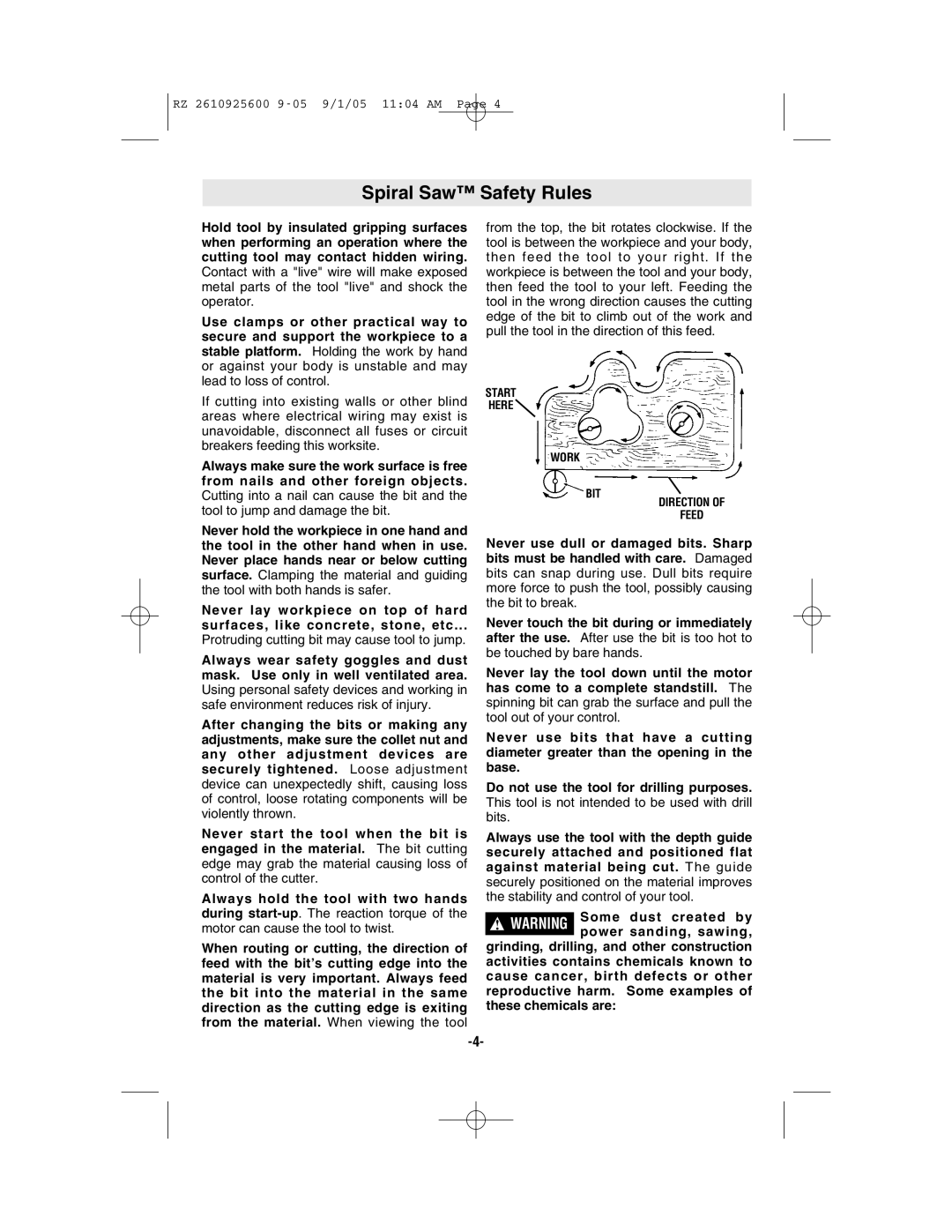
RZ 2610925600
Spiral Saw™ Safety Rules
Hold tool by insulated gripping surfaces when performing an operation where the cutting tool may contact hidden wiring. Contact with a "live" wire will make exposed metal parts of the tool "live" and shock the operator.
Use clamps or other practical way to secure and support the workpiece to a stable platform. Holding the work by hand or against your body is unstable and may lead to loss of control.
If cutting into existing walls or other blind areas where electrical wiring may exist is unavoidable, disconnect all fuses or circuit breakers feeding this worksite.
Always make sure the work surface is free from nails and other foreign objects.
Cutting into a nail can cause the bit and the tool to jump and damage the bit.
Never hold the workpiece in one hand and the tool in the other hand when in use. Never place hands near or below cutting surface. Clamping the material and guiding the tool with both hands is safer.
Never lay workpiece on top of hard
surfaces, like concrete, stone, etc ...
Protruding cutting bit may cause tool to jump.
Always wear safety goggles and dust mask. Use only in well ventilated area. Using personal safety devices and working in safe environment reduces risk of injury.
After changing the bits or making any adjustments, make sure the collet nut and any other adjustment devices are securely tightened. Loose adjustment device can unexpectedly shift, causing loss of control, loose rotating components will be violently thrown.
Never start the tool when the bit is engaged in the material. The bit cutting edge may grab the material causing loss of control of the cutter.
Always hold the tool with two hands during
When routing or cutting, the direction of feed with the bit’s cutting edge into the material is very important. Always feed the bit into the material in the same direction as the cutting edge is exiting from the material. When viewing the tool
from the top, the bit rotates clockwise. If the tool is between the workpiece and your body, then feed the tool to your right. If the workpiece is between the tool and your body, then feed the tool to your left. Feeding the tool in the wrong direction causes the cutting edge of the bit to climb out of the work and pull the tool in the direction of this feed.
START
HERE
WORK
BIT
DIRECTION OF
FEED
Never use dull or damaged bits. Sharp bits must be handled with care. Damaged bits can snap during use. Dull bits require more force to push the tool, possibly causing the bit to break.
Never touch the bit during or immediately after the use. After use the bit is too hot to be touched by bare hands.
Never lay the tool down until the motor has come to a complete standstill. The spinning bit can grab the surface and pull the tool out of your control.
Never use bits that have a cutting diameter greater than the opening in the base.
Do not use the tool for drilling purposes. This tool is not intended to be used with drill bits.
Always use the tool with the depth guide securely attached and positioned flat against material being cut. The guide securely positioned on the material improves the stability and control of your tool.
!WARNING Some dust created by power sanding, sawing,
grinding, drilling, and other construction activities contains chemicals known to cause cancer, birth defects or other reproductive harm. Some examples of these chemicals are:
